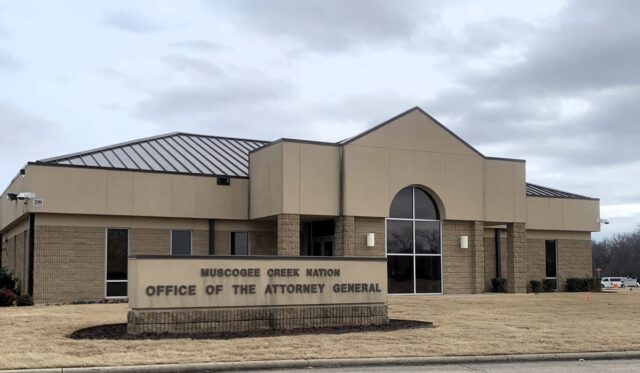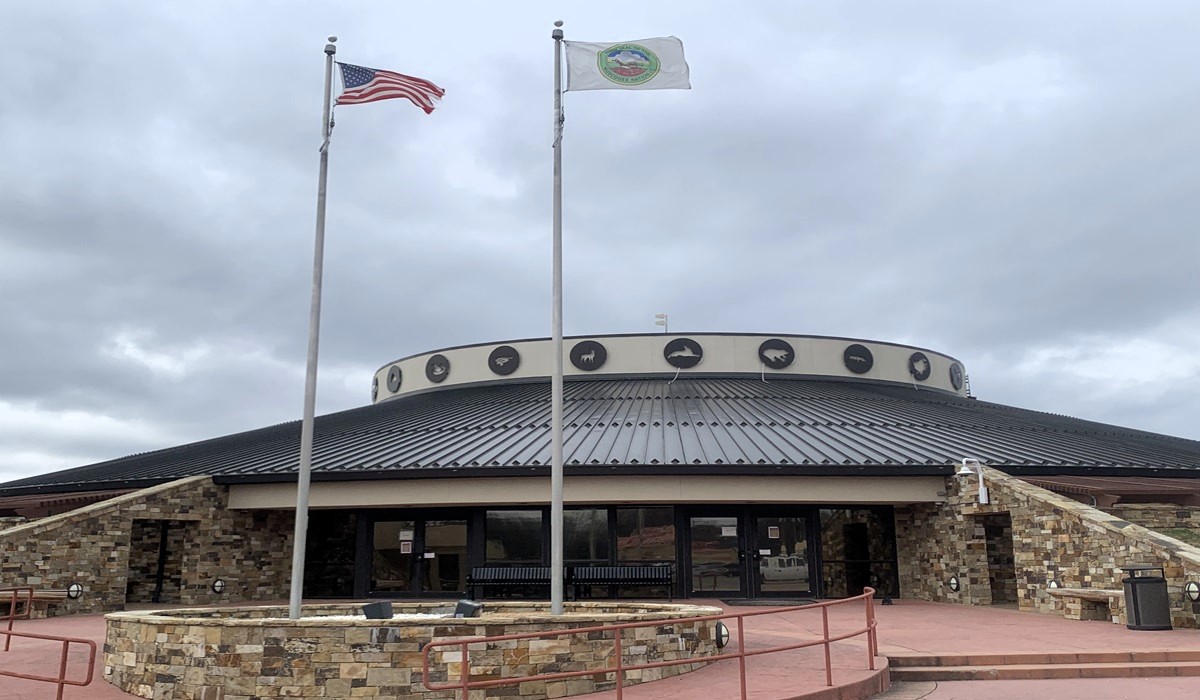

Since the July 2020 McGirt v. Oklahoma decision upheld the Muscogee Nation Reservation’s continued existence — a ruling cited in subsequent affirmations of other reservations in eastern Oklahoma — the Muscogee Nation has taken an active role in defending its sovereign interests in court.
From filing amicus briefs in support of a challenge to municipal court traffic-ticket adjudication in Tulsa to arguing the Stroble v. Oklahoma Tax Commission income tax jurisdiction challenge in front of the Oklahoma Supreme Court, the Muscogee Nation has been proactive in protecting its reservation.
As a result, three major cases involving the Muscogee Nation have been developing through two different federal court districts, and a pending case before the Muscogee Nation Supreme Court could decide whether Muscogee Freedmen will receive citizenship in the tribe.
In the U.S. District Court for the Eastern District of Oklahoma, the nation is defending a suit from Attorney General Gentner Drummond over the prosecution of a non-Indian Okmulgee jailer. In the U.S. District Court for the Northern District of Oklahoma, the nation is on the offense suing the City of Tulsa over its continued prosecution of tribal citizens for municipal offenses occurring within the Muscogee Nation Reservation.
The following roundup examines developments and offers updates on the three cases with precedential possibilities.
Muscogee Nation responds to AG’s suit over Okmulgee jailer prosecution
A literal fight at the Okmulgee County Jail in December between detention officers and Muscogee Nation Lighthorse police led the tribe to charge one jailer, Matthew Joseph Douglas, with assaulting a tribal police officer. The fracas also prompted Gov. Kevin Stitt to create the One Oklahoma Task Force.
The fallout of that incident included the suspension of the Grand River Dam Authority’s cross-deputization commission cards for tribal police, the refusal of tribal governments to participate in the One Oklahoma Task Force, and Oklahoma Attorney General Gentner Drummond filing a federal lawsuit on Douglas’ behalf against Muscogee Nation Attorney General Geri Wisner in the U.S. Eastern District of Oklahoma.
Drummond’s petition argued that 25 U.S.C. Section 1304 explicitly limits the Muscogee Nation’s ability to charge individuals with “assault of a tribal justice personnel” to circumstances where the officer is working a “covered crime” listed in the statute. Covered crimes are defined as assault on tribal justice personnel, child violence, dating violence, domestic violence, obstruction of justice, sexual violence, sex trafficking, stalking and violation of a protective order.
As argued by Drummond, the Muscogee Nation Lighthorse officers were not working a “covered crime” Dec. 18 when they attempted to book a man for drug-related charges. As a result, Drummond argued, federal law did not authorize the Muscogee Nation to exercise criminal jurisdiction over Douglas, a non-Indian.
“Congress does not include (1) narcotics charges or (2) violation of any state laws as ‘covered crimes,’” Drummond’s petition states. “Accordingly, the MCN does not have jurisdiction to charge petitioner with a violation of tribal law for his conduct on Dec. 18, 2023, as any alleged ‘assault of tribal justice personnel’ must have been ‘during, or because of, the performance or duties’ of that officer in ‘detaining … persons charged with a covered crime’ or ‘incarcerating … persons convicted of a covered crime.’”
Riyaz Kanji, David Giampetroni and Philip Tinker of Ann Arbor’s Kanji Katzen, P.L.L.C. submitted the Muscogee Nation’s motion to dismiss the suit April 30. The brief opened by reminding presiding Judge John F. Heil, III of the Muscogee Nation’s sovereign immunity, protecting the nation from lawsuits except where Congress or the Muscogee Nation has waived the privilege.
The majority of the nation’s brief revolved around the argument that 25 U.S.C. Section 1304 requires Douglas to make his jurisdictional argument in Muscogee Nation District Court and receive a final ruling before filing a writ of habeas corpus in federal court.
“The nation’s court system accordingly must have the opportunity to review those facts and petitioner’s jurisdictional arguments before they can be considered by this court,” the Muscogee Nation’s attorneys wrote. “Congress has spoken, and unless and until the plaintiff has been convicted by the tribal court and has exhausted all remedies available to him in that forum, this court has no power to grant him the relief that he seeks.”
On May 21, Drummond submitted his reply brief, arguing that the Muscogee Nation clearly lacked jurisdiction and that the tribal remedy exhaustion doctrine — which generally requires parties to go through a tribal court proceeding and tribal court appeal before seeking relief in federal court — did not apply to Douglas’ circumstances.
“Petitioner is not required to seek relief from a tribal court that does not have jurisdiction over him, and this court should not require him to exhaust his remedies before that court,” Drummond wrote. “Exhaustion before a tribal court is only a matter of comity, and petitioner is not required to litigate before a tribunal that patently lacks jurisdiction over him.”
Since Douglas’s case is the first of its kind in federal court testing the scope of the “special tribal criminal jurisdiction” application authorized by Congress in 2022, the case’s outcome could influence how courts across the country approach the issue.
U.S. intervenes, supports Muscogee Nation against City of Tulsa
The United States filed a motion to intervene in the Muscogee Nation’s lawsuit against the City of Tulsa on May 13, arguing the federal government should be included as a party to the litigation. The motion included a copy of an opening brief the federal government intends to file if the motion is granted, and it argued the U.S. federal government has an interest in intervening both to protect tribal sovereignty and preserve federal power over Indian affairs.
The lawsuit filed by the Muscogee Nation seeks a declaration that the City of Tulsa lacks criminal jurisdiction to prosecute tribal citizens — such as adjudicating traffic tickets — in municipal court. The city’s courts have continued to prosecute tribal citizens despite the U.S. Supreme Court’s McGirt v. Oklahoma decision in 2020 and the 10th Circuit Court of Appeals’ Hooper v. Tulsa decision in 2023, which implied the city lacked such jurisdiction.
“The decision by the Department of Justice to step forward on our behalf is an affirmation of what we have said all along. The City of Tulsa is violating the law and tribal sovereignty to the determent of public safety across the city,” Muscogee Nation Chief David Hill said in a statement. “This supportive brief from the DOJ not only reinforces the federal government’s duty to uphold the rights of the Muscogee (Creek) Nation but also sets a precedent for the respect of tribal sovereignty nationwide.”
The filings argue the United States has an interest that “includes protecting the longstanding rule that the state and their political subdivisions lack criminal jurisdiction over Indians in Indian Country unless Congress authorizes it.”
The filings also include reference to two treaties between the United States and the Muscogee Nation. In 1832, the United States promised the Muscogee Nation that “no state or territory shall ever have a right to pass laws for the government of such Indians,” while in 1856 it promised the nation “full jurisdiction” over Indians within its reservation. Treaties entered into between the United States and tribal governments are generally considered still in effect unless specifically abrogated or repealed by Congress.
The intervention follows the United States filing a similar brief with the Oklahoma Court of Criminal Appeals that made largely the same arguments in Stitt v. Tulsa, a pending case involving a speeding ticket prosecuted in municipal court against Oklahoma Gov. Kevin Stitt’s brother and Cherokee Nation citizen, Keith Stitt.
The two pending cases cover virtually the same issue broadly, but they have different procedural postures and were filed in two separate court systems at different times. Deciphering the full implications of each case will likely take some time after they are resolved. In terms of the legal process, the Oklahoma Court of Criminal Appeals case is farther along and likely to finish before the federal case.
However, any decision by the Court of Criminal Appeals will necessarily implicate federal Indian law, substantially increasing odds that the U.S. Supreme Court would entertain an appeal of the case regardless of which side prevails.
Muscogee Nation Supreme Court to hear Freedmen case arguments

The Muscogee (Creek) Nation Supreme Court has set oral arguments for Friday, July 26, on a pending case about whether Muscogee Freedmen are entitled to citizenship in the Muscogee Nation, nearly 45 years after the tribe limited citizenship to “Creeks by blood.” Muscogee Freedmen are the descendants of African slaves owned by some members of the Muscogee Nation prior to their emancipation in 1866 after the U.S. Civil War.
According to professor Kathryn Braund, the Muscogee Nation practiced slavery prior to European colonization, however slaves were taken during wars and their descendants were integrated into the tribe. In the 18th century, hereditary slavery — where the children of slaves are also considered slaves — was introduced to the Muscogee Nation by Europeans. The nation both bought African slaves from Europeans and integrated escaped slaves as citizens.
In 1818, the Muscogee Nation codified its first written law regarding slavery, mandating that “if an Indian kills a Negro, he shall pay the owner (…) the value.” By 1825, several additional laws were passed barring slaves from owning property, banning the taking of war slaves, exempting slave owners from honoring agreements entered into by their slaves and providing for the death penalty should a slave kill another slave.
When the Muscogee Nation was removed on the Nene ‘Stemerktv, or “road of suffering,” its members’ African slaves and adopted Black Creeks were also forced to march to Indian Territory.
The question of slavery divided the Muscogee Nation as much as it divided Americans, with the nation experiencing its own civil war during the American Civil War between the pro-Union followers of Opothleyahola and the pro-Confederate national government.
After the Muscogee Nation passed a law requiring free Black people living in the nation to choose a Muscogee master or be auctioned in March 1861 and signed a treaty with the Confederacy, Opothleyahola gathered a group of Muscogee citizens opposed to the alliance with the Confederate States of America. After his followers reached about 7,000, the Muscogee Nation government cracked down on the movement, sparking a civil war within the tribe that would see one in four Muscogee citizens missing or dead by its end.
The devastation of the Civil War in Indian Territory was compounded by its proximity to Indian removal. Tribes removed before the Civil War had about one generation to recover from removal before war ravaged their homes.
In the Muscogee Nation’s case, thousands died during removal, including more than 300 citizens killed in one day during the 1837 Monmouth steamboat disaster, the worst pre-Civil War boat accident on the Mississippi River. According to Yvonne Lewis Day, vice president of the Baton Rouge Genealogical and Historical Society, the victims of the Monmouth disaster were buried in unmarked mass graves near Port Allen whose exact locations are unknown.
After the Civil War, the Muscogee Nation signed a treaty with the United States in 1866 that required the nation’s slave owners to free their former slaves and required the Muscogee Nation to grant their descendants “all the rights and privileges of native citizens.” After the treaty of 1866, the Muscogee Nation granted their Freedmen citizenship, and several held positions in tribal government.
In 1979, the Muscogee Nation adopted a new constitution that specified members must be “Creek by blood” to be eligible for citizenship. When the tribal rolls used by the Muscogee Nation to determine citizenship were made, two rolls were created: a Freedmen roll and a Creek-by-blood roll. The 1979 constitution limited citizenship to individuals descended from the Creek-by-blood roll, effectively disenrolling citizens who can only trace their ancestry to the Freedmen roll.
The next 40 years saw several lawsuits filed by Muscogee Freedmen advocates seeking citizenship in the nation, culminating in an order by Muscogee District Court Judge Danette Mouser on Sep. 27, 2023, that found the 1866 treaty “required inclusion of the Creek Freedmen and their lineal descendants within the citizenship of the Muscogee Nation.” The order was stayed pending the appeal in the Muscogee Nation Supreme Court.
As the July 26 oral arguments approach, the Muscogee Nation Supreme Court denied amicus brief filing requests from Georgia State Rep. Dewey McClain (D-Atlanta) — an Okmulgee native and a former player with the NFL’s Atlanta Falcons — as well as several members of the U.S. House of Representatives — including Maxine Waters (D-California), Barbara Lee (D-California) and Rashida Tlaib (D-Michigan). The court said the requests were untimely.




















